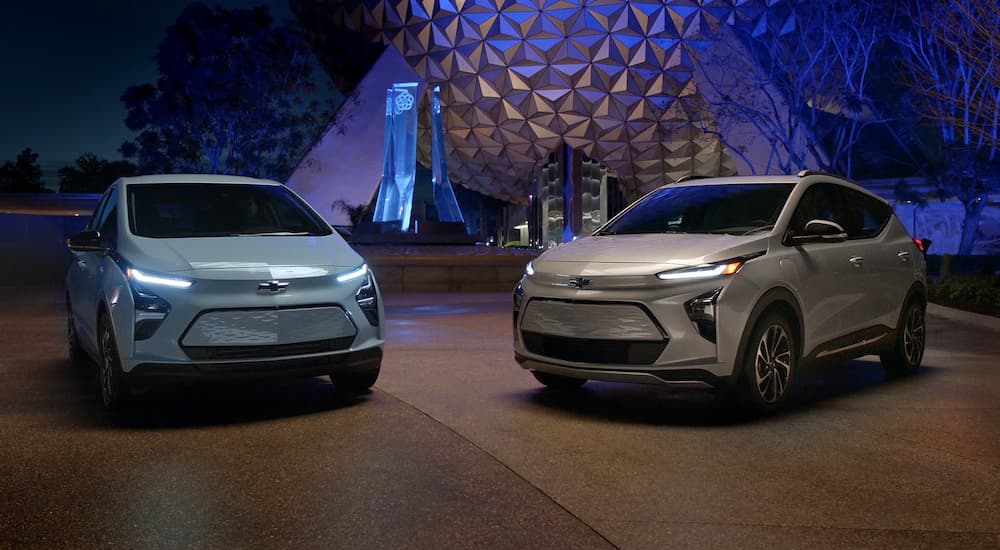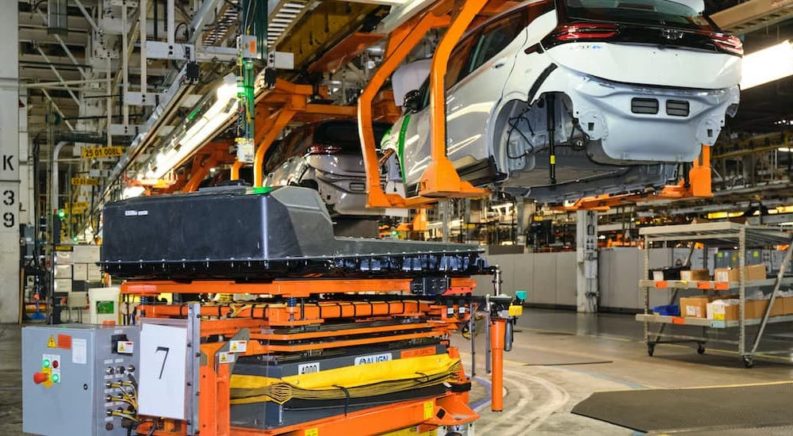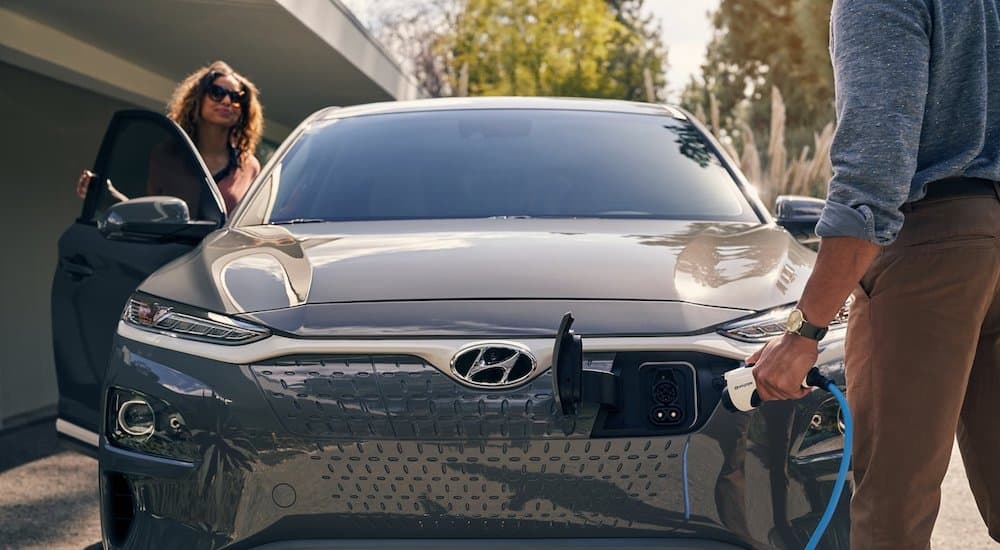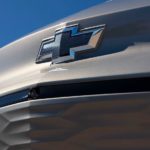For years now, the Bolt EV has been Chevy’s flagship electric model. This year, the Bolt lineup is getting expanded with the addition of the crossover 2022 Bolt EUV on top of a redesigned 2022 Bolt EV. And yet, this all-new model hasn’t been the major Chevy Bolt story dominating headlines the last couple of weeks. Instead, there have been growing reports and concerns about fires being caused by Bolt EV batteries – fires that have caused serious property damage and destroyed homes, though fortunately, no one has been injured so far.
Today, we’re going to take a look at what’s going on with Chevy Bolt EVs and the fires that are happening with alarming frequency. Unfortunately, a lot of information is being kept pretty low-key and unconfirmed at the moment, but I’m not terribly interested in speculation. So I’m going to stick to the facts, as we have them available, as much as possible and look at what’s been happening and what it might mean for the future of Chevy EV models.
Chevy Bolt EV Fires in 2020
Although these Chevy Bolt EV fires are making headlines right now, the first cases of them actually go back more than a year. I can’t say definitively that it was the same issue causing fires involving Bolt EV models at that time since I’m not an investigator working on this case or anything like that. All that can be said for certain is that the early models that this seems to have happened with were from 2017.
There are two reports of Bolt EV fires in 2019, one in Ukraine and one in Massachusetts, but only the MA one was confirmed by GM to be related to the battery. One of the earliest incidents was in June of 2020 in Miami, Florida, where a Bolt EV was fully charged and had been left unattended. The fire department had to visit twice to put out the fire completely, and this was confirmed as being battery-related by GM.
A few days later, on July 4 in Virginia, a Bolt EV had been fully charged and was sitting at the owner’s parents’ house when smoke was reported. According to reports, the fire department doused the vehicle for an hour, but it began to burn again, and a third fire started after the vehicle had been taken to the dealership. GM has confirmed that this was also battery-related.
Two more fires followed suit toward the end of July in New York and California, with another Bolt EV fire in California at the start of August. Three fires were reported in October of 2020 in Florida and New Jersey. In all three of these cases, the vehicle was charging or had been fully charged before the fire started.

The First Recall
The result of all of these fires was that a recall was issued by GM in November of last year to address the risk of a battery fire with the Bolt EV. This recall instructed owners not to charge their vehicles beyond 90% capacity and to avoid depleting their batteries below about 70 miles of remaining charge. In order to correct the issue thought to be causing these fires, a software update was released this year as a fix to the issue.
Chevy Bolt EV Fires in 2021
And yet, this fix has clearly not resolved the issue because fires involving Chevy Bolt EV batteries have continued this year. In some of these cases, investigators have been able to confirm that the vehicle received the software update that was supposed to fix the problem. And yet, fires have recently been reported, and the issue remains.
The first of the fires this year seems to have occurred on May 1 in Virginia. The vehicle had charged overnight, unplugged in the morning, and was parked in the owner’s garage. Several hours after the vehicle had been unplugged, it caught fire. It’s worth noting that in this case, the car had received the initial temporary fix, but the final software update had not yet been applied.
More recent reports of battery fires with the Chevy Bolt EV both occurred in July of 2021, on the first and second days of the month. One of these cases occurred in Vermont and the other in New Jersey. Both vehicles had been charged to full capacity and were parked after charging when they burst into flames. These two cases are important because both times, the owner reported that Chevy’s final software fix for the fire issues had been applied in the months prior to the conflagrations.
The Second Recall
Due to these recent fires, Chevy issued another recall on the Bolt EV in order to address what it has called “two rare manufacturing defects in the same battery cell,” which seems to be what’s causing these fires. With this second recall, they’re once again instructing Bolt EV owners to restrict charging to 90% and not take them below about 70 miles of remaining range. It’s also interesting to note that with this recall, Chevy has instructed customers to park their vehicles outside after charging and not leave their vehicles charging overnight due to “an abundance of caution.”
I think it’s also interesting to note a common trend among the vehicles that have burst into flames so far: none of them are 2020 or 2021 models. So far, most of them are 2019 Chevy Bolt EV models, with several 2017s and at least one 2018 model thrown in for good measure. Does that mean that the latest model year features batteries that lack the fiery defect of the older models? It’s certainly a possibility.
Common Factors: The LG Batteries
It’s easy to point the finger at GM here since it’s their vehicle, and they’ve been trying to downplay this issue and ignore it for as long as possible. However, the evidence suggests that the problem stems from the LG batteries that have been used in the Bolt EV. Not only because it’s the batteries that seem to be catching fire, but also because this is not exclusively a Chevy issue.
The Hyundai Kona also had issues with catching fire, with more than a dozen fires in South Korea and Canada due to battery issues with the Kona. Hyundai’s response to this, however, was to recall the Kona and replace all of the battery packs in the vehicles that had these potentially faulty LG batteries. As a result, Hyundai has not had any further issues with battery fires.
GM chose to try to fix this problem with a software update, however, rather than take the potentially costlier action of replacing batteries. While GM claims that the issue affecting the Bolt EV is different from what Hyundai was dealing with, it’s hard not to notice that their solution seems to be faulty so far. As of writing this, GM has not offered any information on a new solution to the battery fire issue beyond the current recall and instructions to customers.
What Does This Mean for the Future?
The initial response from a lot of drivers is worry about the risks of battery fires with EV models going forward. In reality, statistically speaking, a traditional internal combustion engine vehicle is just as likely to burst into flames as an EV model. But since EVs are making headlines for all the wrong reasons at the moment, this is certainly adding fuel to the flames for people who want to dig in their heels and fight against the move toward an all-electric future. It would be easier to assuage those concerns if companies like GM would follow Hyundai’s lead and immediately solve this kind of thing in a meaningful way, rather than trying to have their software engineers attempt to fix faulty hardware.





